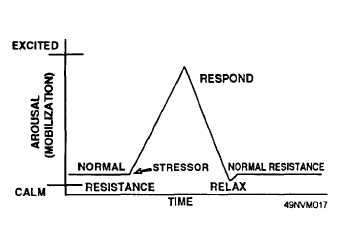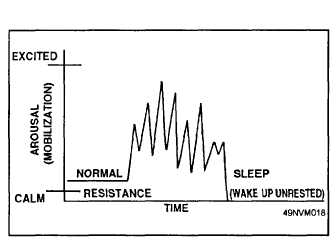| |
has had great success in this mode of prospecting will
view the demand as a eustressor. On the other hand,
a more introverted recruiter who has not met with
those successes may view PDCing as a distressor.
Your job is to help minimize this recruiter’s distress
through training and positive experience.
STRESS RESPONSE
It is important to understand how we respond to
stress when learning how to manage it. Responding
effectively to stress depends on how well prepared we
are before the stress is introduced.
Effective Stress Response
Figure 3-6 shows an effective stress response. We
have a normal resistance level that allows us to keep
calm and collected. When a stressor is introduced, we
respond to it by some sort of mobilization. Our
arousal level is raised. When the situation is over, our
normal resistance drops to a lower than normal level.
With time to rest and relax, we regain our normal
level of resistance so we are prepared to meet the next
stressor.
Ineffective Stress Response
Have you ever had one of those days when
everything that could go wrong did? When our day
becomes too hectic and we me forced to meet a
continuous barrage of stressors, our stress response
may end up looking like the one shown in figure 3-7.
As the day started we had our normal resistance level.
As we met each stressor with different levels of
arousal, we never had the chance to rest and relax.
Figure 3-6.—Effective stress response.
Figure 3-7.—Ineffective stress response.
Our normal resistance level was never restored. We
were less and less prepared to meet the stressors as
the day wore on. When we finally did get to sleep, it
was too late. We ended up waking up feeling
unrested. What can we do about those days?
Obviously, we can’t just walk away from problems.
We can, however, take time during the day to restore
our normal resistance level. Walk around the block.
Try deep breathing exercises – whatever works for you.
PSYCHOLOGICAL ASPECTS OF
STRESS
We have looked at the physical aspects of stress.
What about the psychological side of stress
management? Another leader in the field of
occupational stress is a psychologist named Dr. Joseph
E. McGrath.
McGrath’s Definition of Stress
McGrath said, “Stress is the consequence of
confronting a situation in which usual modes of
behaving are insufficient and the consequences of not
adapting are serious.” This really sounds like
recruiting duty.
New recruiters will face situations
where their normal rate training is insufficient. If they
don’t adapt to the recruiting environment, they will
face unpleasant consequences such as loss of
confidence and maybe even transfer.
Self-Concept
Stress usually involves a demand or obstacle that
we feel we don’t have the ability to handle. This is
where recruiters’ self-concept can affect the way they
deal with stress. People’s self-concept is the core of
their personality. It affects how they see themselves,
3-16
|


